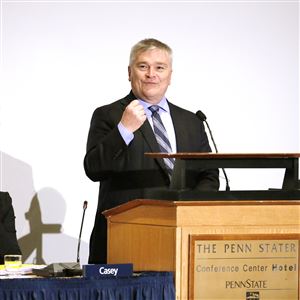Former Penn State University president Graham Spanier practically begged the National Collegiate Athletic Association not to exacerbate the “profound” damage that had already befallen his university, and his own reputation.
His successor, Rodney Erickson, worried that fighting the NCAA’s proposed sanctions would “make ourselves look worse, and unrepentant in the eyes of the nation,” following the Jerry Sandusky scandal.
And NCAA president Mark Emmert was so concerned about self-image that he asked public relations staff to revise his own Wikipedia biography, because it “grossly misses the mark” on his handling of the episode.
Those email exchanges were included among the 4,900 pages of sworn depositions and accompanying exhibits amassed during state Senate Republican leader Jake Corman’s lawsuit against the NCAA, over the collegiate sports association’s punishment of Penn State and its football program in the wake of the Jerry Sandusky child sex abuse scandal.
Last month, the NCAA, Penn State and Mr. Corman agreed to settle the lawsuit that will allow money from the university’s $60 million fine to remain in state and restore 112 wins to the football program that were taken away as part of a consent decree.
While some of the emails and depositions were reported on previously, other documents were made available for the first time Wednesday, as Mr. Corman continued to wage his campaign against the NCAA and its president, Mr. Emmert.
The documents, Mr. Corman said, paint a picture of a man who is no longer a “credible” leader of the NCAA. But the larger picture is one of two powerful institutions that, by all appearances, were very much concerned about appearances.
The NCAA and its new president — Mr. Emmert assumed the NCAA presidency in November 2010, one year before a Centre County grand jury would charge Sandusky with dozens of sex crimes — didn’t want to look feckless in the face of a major sports-related scandal. Penn State wanted to staunch the bleeding.
Both were concerned about public perceptions, and how the 2012 sanctions, including a $60 million fine, a postseason ban and the loss of football scholarships, would reflect upon their organizations.
Three years later, the consent decree — meant to enhance the NCAA’s reputation and ward off further damage to Penn State’s — was thrown out, and neither party looks better for it.
‘All about image’
When Mr. Emmert started at the NCAA, college athletics was in the midst of major changes. Major conference realignment had threatened the power of the NCAA. The Penn State scandal offered Mr. Emmert a chance to reassert its authority.
Meanwhile, Penn State had gone through major upheaval of its own. The university fired its legendary football coach, its president, an executive vice president and its athletic director. There were riots on campus after Joe Paterno’s firing, and protests after the university removed his statue following the release of the Freeh Report, commissioned by the university to investigate the Sandusky scandal.
In a deposition, Mr. Erickson said he believed Penn State did not have many options.
If the university rejected the consent decree, the NCAA could have opened an infractions case with harsher penalties, requiring several years of litigation and appeals. And having an NCAA infractions committee on campus, “looking under every rock,” might have worsened the outcome, he said.
Inside the NCAA, some believed Mr. Emmert was grandstanding.
In a July 2012 email to Penn State outside counsel Gene Marsh, Shep Cooper, an administrator in the NCAA’s committee on infractions, said he did not think the NCAA should penalize Penn State.
“However, the new NCAA leadership is extremely image-conscious,” Mr. Cooper wrote, “and if they conclude that pursuing allegations against PSU would enhance the association’s standing with the public, then an infractions case would follow.”
The following month, in an email to an NCAA investigator, Mr. Cooper lamented “it’s all about ‘image’ with the NCAA national office nowadays.”
And in December 2012, Mr. Emmert emailed NCAA vice president of communications Bob Williams after reading his personal Wikipedia biography, which suggested that Mr. Emmert “overstepped his boundaries” by penalizing Penn State.
“Check it out and see how we can put the record straight,” Mr. Emmert wrote.
His staff crafted a new description of his handling of the Penn State scandal, and most of those revisions were still part of his Wikipedia biography Wednesday night.
‘No longer credible’
If Penn State and the NCAA were concerned, perhaps overly so, with self-image, today it is Mr. Corman who is doing the preening, said the NCAA’s chief legal officer, Donald Remy.
“Sen. Corman is obviously seeking to further politicize a matter that has been already resolved,” Mr. Remy said in a statement released by the NCAA. “It is no coincidence that his political career was simultaneously elevated during [the] litigation … the NCAA agreed to move forward so that discussions could be rightfully refocused towards child sexual abuse survivors.”
On Wednesday, Mr. Corman said he would be sending the depositions and related files to Pennsylvania’s congressional delegation with a request that they investigate the NCAA’s actions, and to the NCAA executive committee itself.
“If they truly believe in those core values and they read all this information and review it for themselves, they will determine that Mark Emmert is no longer a credible person to lead this organization,” Mr. Corman said.
U.S. Rep. Tim Murphy, R-Upper St. Clair, who chairs the Energy & Commerce Subcommittee on Oversight & Investigations, said in a statement that he is reviewing “whether these issues require greater scrutiny and action by Congress.” And U.S. Rep Charlie Dent, R-Allentown, said in a phone interview that “the NCAA, in my view, is an organization incapable of reforming itself. Congress needs to exercise proper and better oversight on that organization.”
On Wednesday, Mr. Corman said the documents show that Mr. Emmert and his staff “knowingly manipulated” the NCAA executive committee and bluffed Penn State officials to get them to agree to sanctions.
The manipulation to which he refers was the NCAA’s supposed threat of a “death penalty,” which would have temporarily suspended the football team’s operations. Throughout the depositions, and supporting emails, Penn State officials and outside legal counsel seem to be under the impression that if they didn’t accept the NCAA’s proposed consent decree, the NCAA was in favor of imposing a death penalty.
But, according to Mr. Corman, “a vote was held by the NCAA Executive Committee specifically on the ‘death penalty’ issue and it was overwhelmingly rejected.”
In his own deposition, taken Dec. 2, 2014, Mr. Emmert said the NCAA did not try to coerce Penn State into accepting the sanctions.
“Of course they felt like they were in a difficult place, because they were in a difficult place. Any university would have been. But no one was saying this was take it or leave it.”
Graham Spanier and two other former administrators, Gary Schultz and Tim Curley, are acccused of taking part in a “conspiracy of silence,” relating to their handling of the Sandusky scandal. They are awaiting trial and maintain their innocence.
The three defendants face charges of perjury, obstruction, conspiracy, child endangerment and failure to properly report suspected abuse.
First Published: February 11, 2015, 6:29 p.m.
Updated: February 12, 2015, 6:36 a.m.


















